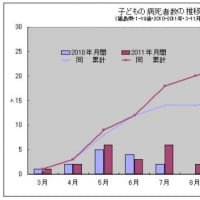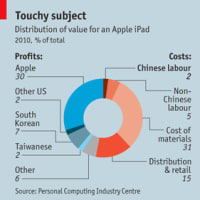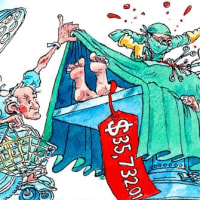
日本で税と社会保障なんて議論が盛んに行われているようなんですが、米国の状況についてロンドンエコノミスト。
Shopping around for surgery

米国では、ブッシュ時代に、いわゆる消費者主導の健保プランなるものが立法されているようでして、
Consumer-driven health care
ここ十年、ヘルスケアコストは、上昇を続けるものの、上昇幅がゆっくりになりつつあって、いろんな理由が考えられるものの、ひとつは、その、コンシューマードリブンヘルスプランによるのだ、ということなんですな。
Under “consumer-driven health plans”, workers must cough up part of the price of any treatment before their insurance coverage kicks in. Most have an untaxed account to spend on health; they think twice before depleting it. In 2006 only 10% of workers had to pay at least $1,000 before their insurer picked up the rest of the bill. By 2010 that share had more than tripled.
そのプランのもとでは、保険料がおりる前に、いくらか自分で払わないけいけないとか、
負担が目に見える形になっているわけですね。
コストを下げようと、そのプランを採用する企業が増えていて、
General Electric (GE) shifted its salaried employees into consumer-driven plans in 2010. It urged them to shop around for bargains, but they found this nearly impossible due to a lack of information. “People started saying: ‘If you want me to be an active consumer, I need to know prices,’” explains Virginia Proestakes, the head of GE’s benefits programme. When employees asked doctors for prices, the doctors were baffled. They had no clue how much different insurers paid for the same procedure, or what share a patient would pay. A recent study by the Government Accountability Office (GAO), a public watchdog, reported similar problems.
GEも2010年から採用。従業員は、どの病院で、どの治療をするか買い物をするように自分に適した治療を探すことになるが、問題は情報不足。ドクターに治療の値段を聞いてもわからない。
Barack Obama’s health reform requires hospitals to list standard prices each year, and more than 30 states have either proposed or passed laws to promote price transparency, according to the GAO. None of these measures has come close to solving the problem. Few provide enough data to allow people to shop around.
オバマケアでは、病院に毎年、標準的な治療の価格をリストするよう求めている。
So private firms are having a go. GE, for example, hired Thomson Reuters, an information firm, to show employees the cost of different services. Thomson Reuters analyses prices from prior purchases—by workers at GE and other firms—to show the cost of a given procedure at different hospitals and clinics.
GEでは、異なるサービスのコストを従業員に伝えるために、トムソンロイターズを雇った。
ヘルスケアコストは複雑だし、症状によって治療方法も異なったり、あるいは、保険会社もどこに、との治療でいくら払っているかを開示するのを嫌がって、価格情報開示というのは難しい問題があるが、
Despite this, greater transparency seems inevitable. Smart insurers are hawking their own tools. Cigna uses Thomson Reuters’s technology to support its “cost of care estimator”. Aetna, another insurer, offers a sophisticated web tool that patients use more than 67,000 times a month. Meg McCabe of Aetna hopes that consumers will soon be able to use their smartphones to enter symptoms, find doctors, compare prices and schedule an appointment.
それは避けられないようよみえる。賢い保健会社は、開示を売りにしているところがある。
Such experiments will serve insurers well. If Mr Obama’s health law stands, millions will soon shop for insurance on new exchanges. The easier the plan is to understand, the more people may pick it. A fully transparent market is years away. But a bit of sunlight is creeping in.
そうした保険会社の実験的な動きは、報われるだろう。オバマケアでは、数百万人が新しく保険会社を探すことになる。分かりやすいプランを多くの人達が選ぶことになる。全面的な情報開示による透明性は数年先になるが、兆しは見えてきている。
ということで、社会保障の分野でも、ブッシュ時代の立法で大きく変化があるということですね。
また、オバマケアには、いろんなしかけがしてあって、保険会社も対応していかざるを得ない。
オバマさんが、しきりに、オバマケアで、今後のヘルスケアコストは余計に増えるのでは無くて、上昇を減らすことができるのだ、と繰り返し強調するのは、こうした背景があるんでしょうな。
オバマ、恐るべし。




















※コメント投稿者のブログIDはブログ作成者のみに通知されます